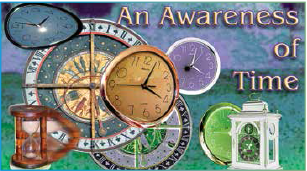

When we get right down to it, we have to draw one inescapable conclusion: time is our most important asset. And like most assets, there never seems to be enough of it. There are always so many things to do, so many pressures, so many things to keep track of. Our lives seem to whiz by, and where has our time gone? If time is our most important asset, why do we know so little about it? Why do we stay so busy yet accomplish so little? Are our accomplishments all that important in the overall scheme of our lives? In a sense, when we simplify our lives and become aware of the rhythms of life that occur internally, we can cultivate our sense of time – and we gain self-knowledge that generally escapes us within the bustle of our daily lives.
Think what modern-day life encourages us to do. We need to keep up with the news, drive to work, perform meritoriously on the job, work overtime, maintain a spiritual life, have many friends and a few deeper relationships, be a good partner and perhaps a good parent, keep up with TV and movies and books and music and all the new ideas, travel, have several hobbies, dress in the right fashions, spent time on the Internet, keep good credit, be a good neighbor and participant in the community, do volunteer work, take classes, exercise, and so it goes. It is little wonder that many of us feel so pressured. In the end, what really matters is how well we have lived, not necessarily how much we have done.
Like all things natural, our bodies have internal
rhythms. There are times during the day, or even
the month, or the year, when we do things well,
quickly, and easily. We have spurts of energy
when we are at our best. And there are other
times when our bodies cry out for rest, for down
time. To try to be at your most productive during
this part of the cycle is futile, and it leads to a
great increase in stress on your body. |
|
|
| |
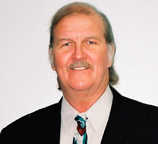
 Robert F. Smith Robert F. Smith
 Licensed Therapist Licensed Therapist 
 Certified Addiction Counselor Certified Addiction Counselor
 License Number - SW010318L License Number - SW010318L
 Phone -484-686-4903 Phone -484-686-4903
 Fax -610-491-9253 Fax -610-491-9253
 Website - www.lifeissuescounseling.com Website - www.lifeissuescounseling.com 
I am in Private Practice and specialize in the
areas of
-
Family Counseling
-
Individual and Couples Counseling
-
LGBT and
-
Adolescents
I work with people regardless of age, race or
sexual preference. Clients who struggle with–
-
Anger
-
Relationships
-
Intimacy and
-
Communication
often find working with
LIFE ISSUES COUNSELING
a rewarding way to gain a sense of balance in
their lives.
"People will forget what you said. They will
forget what you did, but they will never forget
how you made them feel."
 – Maya Angelou – Maya Angelou
|
|
|
This is one
factor related to some disturbing societal trends: the incidence of cardiovascular and immunedeficiency
diseases in American over the last few
decades has been astounding, not to mention the
increase in rates of depression, family destruction,
and substance abuse.
Many cultures incorporate these natural body cycles into the rhythms of daily life: think of the English with their afternoon tea or Hispanic cultures with the afternoon siesta when virtually everything closes down. In America we punish ourselves for feeling less than productive at all times. We drink another cup of coffee for its caffeine rush, and then we plod ahead, trying to accomplish all we can even when our bodies are crying out for some R&R time. We lose awareness of our need to rest, to do nothing. The irony of all this, of course, is that if we could get in touch with the body’s natural rhythms, alternating between periods of activity and rest, we would be much more productive in the long run.
A recent poll found that the average American had 37 percent more leisure time in 1973 than now. All of our technological advances, like computers, cell phones, e-mail, text messages, social media sites, and computerized gadgets everywhere, don’t really give us more time, contrary to popular myth. If anything, they contribute to time pressure. Giving in to this pressure serves to isolate us from other people so that we no longer have the time for easy personal conversation that tends to buffer us from anxiety and disease. We easily anger when someone slows us down or interrupts our concentration. We pay more attention to small, urgent details rather than developing an awareness of the most important things in our lives. Our self-esteem drops when we feel that we can never keep up or do all that we should be doing. We may lose sleep, eat poorly, avoid exercise, and rely on sweets, alcohol, or other drugs to keep us going.
Until the Middle Ages there were no clocks.
Other cultures even now measure time more in terms of seasons or other natural cycles than by hours and minutes. Just two or three generations ago people had much more free time just to be, to enjoy, to develop more meaningful relations. This is not to suggest that we should go back in time, because we cannot. But we do need to get in touch with our more natural internal rhythms which are a primary source of stability and health and to incorporate this awareness into our everyday lives. Rather than trying to squeeze more activities into the time we have available, it may be more helpful to examine what is really meaningful in our lives and to devote our time to those pursuits. The quality of life can be much more meaningful than the quantity of things we try to cram into our lives. In other words, we may need to develop a new relationship – both with ourselves and to time.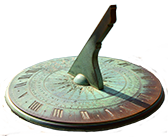
Some Steps to
Taking Ownership
of Your Time
 Take a periodic review of what
is important in your life. Take a periodic review of what
is important in your life.
Reflect on how you have spent the past month or year, what you have accomplished, and how it fits into what you want in your life. What is really important in your life? What do you value most? You may want to make a list to note the things you want to keep and the things you should throw out of your life. You may even conclude that cutting back on work, although it might reduce your income, will actually improve the overall quality of your life. Does the extra money really buy you the things that are most important, especially when you don’t have the time to enjoy them? (Could it really be true that the best things in life are free?)
The most important things in life are really not things at all.
 When in doubt, choose simplicity. When in doubt, choose simplicity.
Our world presents so many possibilities that it is impossible to keep up with everything. Do we really need to watch every episode of a favorite TV show? Are our lives going to be any different if we stop watching the news every night? (In fact, give this a try.) Do we really need to stay constantly aware of our cell phones? Rather than spending a fortune on entertainment or a night out, wouldn’t a quiet night talking to a close friend at home be more meaningful? Do we need to give expensive gifts when a handmade greeting would convey the same message? The simpler choices allow us more time to get in touch with things that really matter.
 Move into the present. Move into the present.
Our lives become a melange of schedules and our thoughts seem to focus on what is “out there.” Our rhythms then become determined by the pressured world we inhabit. We become more concerned with the “there and then,” and not with the “here and now.” A beneficial exercise is to make time throughout the day just to experience the moment. Immerse yourself in the present. Become aware of your internal state. At these times stresses can soften. Let this inner awareness, rather than the external frenzy, guide your everyday experience. This is the clue to learning about what is truly important in your life. Absorbing yourself in the present moment is exhilarating and can make you feel truly alive. Your internal knowledge is now the source of what controls your life, not the mundane pressures of the world around you.
 Travel to the beat of your own drum. Travel to the beat of your own drum. 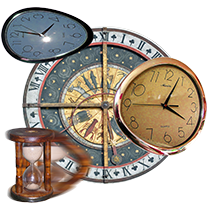
Your body has its own rhythms. Learn what they are. Some of us are nightowls and some of us are larks (or morning people). Some of us have slumps in mid-afternoon. The value of being true to your body’s cadences is inestimable. Respect what your body is trying to tell you. All of nature follows a cyclical pattern (hot to cold, day to night, activity to hibernation). Humans have periods of productivity and energy followed by a need for rest. We need to cycle from doing to being.
Some of us have become so accustomed to adapting to the pressure of the external world that we have lost awareness of our internal state. The “high” that accompanies our adaptation to the stresses of modern life becomes something like an addiction. The busier we are, the more we feel alive. Yet our anxieties increase and we lose track of the experiences which truly matter. Our health deteriorates, our relationships become superficial, and our sense of our own self evaporates. We long for something meaningful and we lack the tools for finding it. The solution to the dilemma involves a paradox: we gain time by giving up time. |
|
|
First, before we begin, check out how much stress you are feeling now, and place it on a ten-point scale. For example, your stress might be at a five or an eight on the scale. (You may want to have a friend or family member read the instructions below out loud the first time you try this exercise.)
Next, find yourself a comfortable chair, sit in it, and find the position where you feel most relaxed. Close your eyes (and keep them closed for the five or so minutes it takes to do this exercise). Check out your face and see if you are holding any tension there, around the eyes, cheeks, or mouth, for example. Then let go of the tension and let your face fall into its natural position.
Now, the only thing we will focus on is our breathing. Let go of thoughts you are having by allowing them to drift away. And turn your focus only onto your breathing. Feel your chest as it moves in and out. Feel the air as it goes past your nose or mouth. Keep your body relaxed.
Then, we will be aware of each breath and feel how pleasurable it is to breathe. Feel the pleasure of each in-breath. Feel the pleasure of each out-breath.
|
 |
Every time you breathe, feel the pleasure of the breath. And we will keep this up for the next two or three minutes. You breathe in, it feels good. You breathe out, and it feels good. Breathe in. Breathe out. Feel the simple, low level pleasure of each breath.
Now, take two more breaths and then open your eyes. What is your current stress level on the ten-point scale?
Do this exercise three or four times a day, with your eyes closed, for the first few days. Then try doing it with your eyes open. It is so pleasant and it gives you such a relaxed feeling that you will look forward to doing it.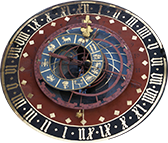 You can even do it while having a conversation with someone when your eyes are open, and the other person need never know that you are doing it. You can even do it while having a conversation with someone when your eyes are open, and the other person need never know that you are doing it.
This is one route
to
self-awareness,
de-stressing, and
gaining a sense
of your
internal clock.
|
|
|
An Awareness of Time
Vol XXII-Num 3 |
Copyright © 2015 Simmonds Pub. |
|
| This newsletter is intended to offer general information only and recognizes that individual issues may differ from these broad guidelines. Personal issues should be addressed within a therapeutic context with a professional familiar with the details of the problems. ©2015 Simmonds Publications: 5580 La Jolla Blvd., #306,
La Jolla, CA 92037
Website ~ www.emotionalwellness.com Graphic Design ~ HARTWORKS |
|

